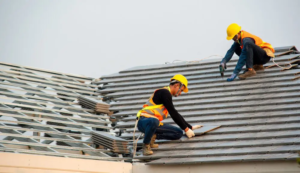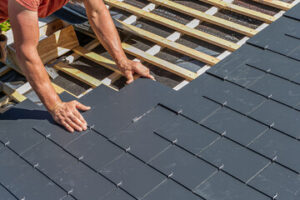A roof is a home’s main barrier to the elements. The right roof, whether built from asphalt, wood, metal, or another material, can protect a house from rain and sun damage.
Roofing involves a lot of physical labor. Those who work in the field might need to wake up early to reach their job site.

If you plan to replace your roof, selecting the right material is a big decision. It impacts the price, lifespan, and more. To avoid buyer’s remorse, you’ll need to weigh your options.
The most important thing is to pick a roofing material that fits your climate and architecture. Then, you’ll need to decide on color and style options that complement your home. You’ll also want to consider how important maintenance and energy efficiency are to you.
Most homeowners choose asphalt shingles for their durability and low cost. They’re available in various styles, colors, and textures that add to your curb appeal. Manufacturers also make shingles that mimic other materials, such as slate and wood.
Another popular choice is metal. It’s available in many colors and designs, including corrugated and standing seam metal. Metal is a good choice for most weather conditions, but it’s especially durable against hail and high winds. Plus, it’s easy to install and affordable compared to other roofing options.
Tile roofing is an expensive option, but it can last for a lifetime. Concrete tiles are made of terracotta or clay and come in a wide range of colors and textures. They’re great for hot climates and can resist high winds, fires and salt air. They’re also highly energy efficient.
Wood is a natural choice for roofing, but it’s not as durable or energy-efficient as some other materials. It’s also a bad idea for humid or wet climates or in areas that are prone to wildfires. Wood shingles are usually produced from cedar or redwood, while shakes are thicker wedge-shaped slices of wood.
If you’re not sure what to choose, talk with your contractor. They’ll be able to help you find a roof that meets all of your needs. They’ll ask questions about your lifestyle and aesthetic, and provide a list of viable roofing options. They’ll also explain the different roofing materials and their pros and cons. They’ll also help you determine if there are any special framing or installation requirements for your roof type. Finally, they’ll provide a detailed estimate for the entire project.
Metal Roofs
Metal roofs are becoming the number two roofing choice for homeowners in North America, with many of them choosing to go with metal over asphalt shingles. This is largely due to their longevity, as well as their durability and low-maintenance qualities. However, the advantages of this type of roofing don’t stop there.
A metal roof’s surface can reflect heat, which can help to decrease cooling costs. Additionally, it is fireproof and can resist wind damage better than other roofing materials. Additionally, it is recyclable at the end of its lifespan, which can save you money on landfill fees.
If you decide to have a metal roof installed, it is important to choose one with hidden fasteners. This will avoid water leaking into the attic and insulation or into the drywall and framing. If you do choose a metal roof with exposed fasteners, it is important to regularly inspect the connections for any signs of water leaks. If this happens, it is important to have it fixed right away to prevent further issues with your home’s structural integrity and safety.
In addition to their longevity, many homeowners enjoy the aesthetics of a metal roof. They are available in a variety of colors and styles, making it easy to find the ideal look for your home’s exterior. They also come with an optional galvanized underlayment that can help protect against moisture and other environmental problems, such as rot and mold.
Those who want a more modern look should consider standing seam metal roofs. These are long sheets of metal that run vertically up the roof, creating interlocking seams that are raised above the roof surface. These roofs are made from steel, aluminum, or copper and are extremely durable and weather, pest, and fire resistant.
While the benefits of a metal roof are many, it is important to keep in mind that this type of roofing can be noisy when it rains or snows. This can be mitigated with additional attic insulation, but this will increase the cost of your roof. In addition, some metals can rust when exposed to the elements, especially if the corrosion is not kept in check.
Wood Roofs
Wood shingles or shakes can give a home a gorgeous rustic look. They are often used to complement homes with wooden siding, brick exteriors and stone accents. They are also great for homes in historical areas or for those who want to maintain a more natural appearance for their property. However, they come with some disadvantages that make them less popular than other roofing materials on the market.
Wood roofs require a lot of maintenance and can be expensive. They need to be treated with flame-retardant chemicals every few years, and they can become moldy, mildewed or infested with fungus. They can also fade and lose their color over time. Additionally, they are more likely to catch fire than other types of roofing material, which can increase your home insurance costs.
If you’re going to choose a wood roof, make sure you get high-quality cedar. The grade you go with will affect its durability and longevity. The higher the quality, the more expensive it is upfront, but the longer your roof will last and the less upkeep it will need down the road.
The biggest downside of a wood roof is that it doesn’t perform well in certain weather conditions. Rain can cause water damage and mold growth, and it can warp and swell the wood. Additionally, hail can leave bruises and cracks in the wood that aren’t good for your roof.
Another disadvantage is that a wood roof doesn’t offer the same insulation benefits as other roofing materials, like asphalt shingles or metal. That means you’ll spend more on heating and cooling your home. Finally, wood roofs don’t usually hold up well in windy conditions. They can withstand moderate winds, but stronger gusts can tear off shingles or even break the wood shakes.
While staining or painting a wood roof will help protect it, it won’t completely stop moisture from seeping into the shingles and causing problems. Moisture can lead to mildew, mold, fungus and rot. To help combat this, it’s a good idea to remove leaves, pine needles and other debris from your roof regularly. Also, periodic preservative and fungicide treatments are known to keep your wood roof looking its best.
Asphalt Roofs
Asphalt shingles are the most common type of roofing in the United States and are a cost-effective choice that provides effective protection from the elements. They are available in a variety of colors, styles and designs that offer homeowners the ability to customize their roof to match the aesthetic of the home. The shingle style can also impact the longevity of the roof. For instance, architectural or laminated shingles have multiple layers and a more textured surface that can improve durability and resistance to impact.
The advantages of asphalt shingles include their ease of installation, affordability, and improved lifespans thanks to advances in roofing technology. They are also water-resistant and comply with fire safety standards. Additionally, they are highly versatile and are available in a number of shapes and sizes.
However, the disadvantages of asphalt shingles include their shorter lifespans than other roofing materials and they are more susceptible to damage from high winds. They may also be prone to mold growth, especially in areas of the roof that are shaded and exposed to moisture. The good news is that a professional roofer can provide regular maintenance and inspections to protect the integrity of the asphalt shingles.
There are different types of asphalt shingles, including 3-Tab shingles, architectural/laminated shingles and luxury/designer shingles. The 3-Tab shingle is the most popular and can be installed on almost any type of roof. Architectural/laminated shingles have multiple layers and are designed to add more visual interest to the roof. They are typically manufactured with a fiberglass base mat and coated in several layers of asphalt and granules. They can also be designed with a textured surface that mimics other materials, such as wood or slate.
Luxury/designer shingles are more expensive than standard shingles but have a distinctive, premium appearance. Many of these shingles are manufactured to mimic the look of other roofing materials, such as cedar shakes and slate tiles. Some also have additional features that can offer performance benefits, such as solar reflectivity or wind resistance. In general, asphalt shingles should only be used on roof slopes of 2:12 or greater. Any steeper slopes should be supported with a stronger roofing system or another roofing material.
